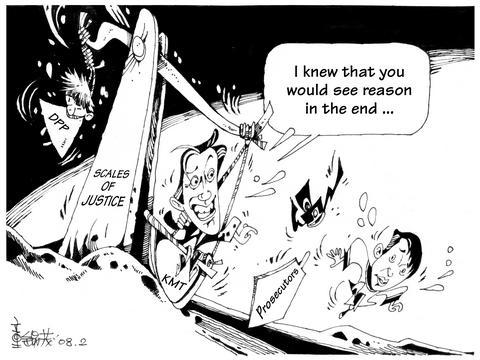¡@
Taiwan shut
out of Olympic warm-up
¡@
SPORTING CHANCE: Taiwan's
medal-winning taekwondo squad will have to make do with watching an invitational
competition in Beijing after being denied entry
STAFF WRITER, WITH DPA, TAIPEI
Friday, Feb 22, 2008, Page 1
A Taiwanese sports group yesterday protested at being left out of a taekwondo
warm-up event for the Beijing Olympics, describing the development as a
political maneuver aimed at downgrading Taiwan.
"We made a verbal protest to the organizer of the Good Luck Beijing event and
asked if they could remedy the situation, but they said it is very difficult,"
said a Chinese-Taipei Taekwondo Association official, who asked not to be named.
"Taiwan won two bronze [medals] at the Sydney Olympics and two gold and one
silver at the Athens Olympics. Four Taiwan players have qualified to compete in
the Beijing Olympics," he said.
"But the organizer said they are inviting only about 100 taekwondo competitors
to the warm-up event out of the 128 competitors who will participate in the
Beijing Olympics. So the purpose of excluding Taiwan players is obvious: It is
to downgrade our international status."
The rules of the taekwondo warm-up are similar to the official competition,
though competitors do not compete on a scoring basis. The main purpose is to
allow competitors to experience the conditions of Olympic competition in advance
of the Games proper.
Not inviting Taiwan's taekwondo squad to the warm-up was tantamount to
"confiscating" the experience from the players, the Chinese-Taipei Taekwondo
Association official said.
Because the warm-up is taking place on an invitation-only basis, the four
Taiwanese players -- Chu Mu-yen (¦¶¤ìª¢), Su Li-wen (ĬÄR¤å), Yang Shu-chun (·¨²Q§g) and
Sung Yu-chi (§º¥ÉÄQ) -- will travel to Beijing and watch the tournament only as
observers. The invitational competition starts on Tuesday.
Taekwondo and archery are Taiwan's best chances of winning gold at the Beijing
Olympics.
Beijing will host the 2008 Summer Olympics from Aug. 8 to Aug. 24. Prior to the
Games, China is hosting a series of "Good Luck Beijing" international
tournaments in preparation for the Olympics.
Under pressure from China, Taiwanese athletes can only attend Olympic Games and
most international sports events under the name of "Chinese Taipei" -- implying
that Taiwan is part of China. The national flag of the Republic of China cannot
be displayed, and only the Chinese Taipei Olympic Committee song -- not the
national anthem -- can be played at medal presentation ceremonies.
For the Beijing Olympics, Taiwan has asked the International Olympic Committee
to guarantee that there will be no political interference and no discrimination
against Taiwanese athletes.
China has promised that it will treat Taiwanese players fairly and in line with
the Olympic Charter.
¡@
¡@

¡@
¡@
Media as a
force for promoting progress
¡@
By Frank Wu
§dÂפs
Friday, Feb 22, 2008, Page 8
`The random vilifying of others on screen is an abuse of the freedom of the
press.'
Heated political debate in Taiwan has given rise to a proliferation of political
talk shows on local TV. These programs are broadcast either in the afternoon or
the evening, and to save on costs, reruns are shown throughout the day. Many of
the commentators, including members of the media, who participate in these shows
have become household names, earning them the sobriquet mingzui (¦W¼L).
Viewed positively, mingzui is used to describe a "well-known commentator or
speaker." But more often than not it comes across as a derogatory title. Media
commentators can be of benefit to society. However, they should exhort each
other to improve their performance.
First, TV commentators should be more judicious in accepting invitations to talk
shows. Politics is a very broad field: National defense, international
relations, the judiciary, the economy and finance are all related to politics,
but each is a discipline in its own right. Field expertise, and not simply
common sense, is needed to come up with convincing arguments that are beneficial
to the country and the public. If a speaker were to decline the invitation
because he or she was unfamiliar with the topic, the TV station can look for
someone more suitable. Declining an invitation would then contribute to
improving program quality.
Second, TV commentators should understand that the objective of the media is to
work for the improvement of society. Hence, rational thinking and discussion are
essential when making commentaries. TV stations and commentators are entitled to
their opinions, but neither should distort the facts. Society, already beset by
internal division, can only advance if we promote more balance. Commentators are
mostly an educated lot: If they have the will and the self-respect, they can
become a positive force in society.
Third, TV commentators should refrain from using bad language on screen and from
quarreling with people who call in. If commentators use bad language on screen,
this reduces a political talk show to an entertainment program, and commentators
to entertainers. As for commentators fighting on screen with callers: Even if
the callers pick a fight, commentators should know better than to stoop lower
themselves to the same level. The random vilifying of others on screen is an
abuse of the freedom of the press, and commentators should refrain from such
behavior.
TV commentators should remember that one leaves footprints everywhere one goes
-- more so participants in a talk shows which are taped and recorded. It might
be difficult to be consistent, fair and honorable all the time. However, honesty
and love of country and the people should be a fundamental and guiding principle
for all commentators.
Commentators who are of good character, learned and conscientious should be
applauded. With their sincerity and sound reasoning, they are a positive factor
in shaping public opinion. Let us hope that all commentators will continue to
improve their performance, so that the media can dispel its reputation as a
source of division and truly become a force for progress.
Frank Wu is a former chairman of the
Public Television Service Foundation.
¡@